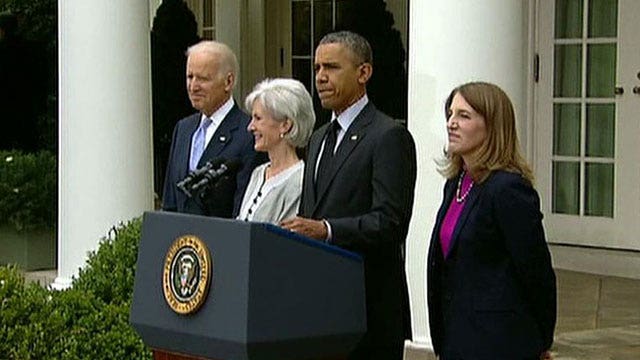Future of ObamaCare in question
Rep. Blackburn reacts to new leadership at HHS after Sebelius resignation
Barack Obama wants you to know he enrolled 7.5 million Americans through ObamaCare’s health insurance Exchanges. What he doesn’t want you to know is how.
Federal courts may soon rule that President Obama induced the majority of those enrollees to enroll by offering them taxpayer dollars he has no legal authority to spend.
If the courts put a stop to that unauthorized spending, a majority of Exchange enrollees would suddenly face the full cost of ObamaCare coverage, and enrollments would plummet.
[pullquote]
Under the Patient Protection and Affordable Care Act, states have the option of establishing an Exchange themselves, or letting the federal government do it. The Act also authorizes subsidies that can require taxpayers to cover nearly the entire premium for Exchange plans. Among the eligibility criteria for those subsidies is a requirement that recipients enroll “through an Exchange established by the State.”
Such requirements are routine, and this one is and unequivocal. Countless federal programs offer subsidies only in states that agree to implement them. The PPACA’s legislative history is littered with Republican and Democratic proposals to offer various subsidies – including tax credits and Exchange subsidies – exclusively in states that establish Exchanges.
The eligibility rules for the PPACA’s Exchange subsidies specify nine times, without deviation, that recipients must enroll “through an Exchange established by the State.” House Democrats even complained about this part of the Senate-passed PPACA before they themselves approved it, so they knew exactly what they were sending to the president’s desk.
Confounding supporters’ expectations, 34 states declined to establish Exchanges. Under the plain terms of federal law, subsidies are therefore available in the 16 Exchanges established by states, and not available in the 34 Exchanges established by the federal government.
In 2011, however, the Obama administration unilaterally announced it would force taxpayers to subsidize insurance purchased through federal Exchanges as well. It cited no statutory authority for its decision, and has stubbornly refused to follow its own law despite immediate and sustained criticism.
In January of this year, the Obama administration began spending billions of dollars of unauthorized subsidies to induce Americans to enroll in the 34 Exchanges established by the federal government. The president is literally forcing taxpayers, without any legal authorization, to subsidize two out of every three Exchange enrollments.
Fortunately, unlike other ways President Obama has unilaterally rewritten the health care law, this one faces credible court challenges. Under the PPACA’s many interrelated provisions, those subsidies trigger penalties against millions of employers and individual taxpayers, who have filed suit asking the courts to put a stop to both.
Last month, one of those lawsuits – Halbig v. Sebelius – went before a skeptical three-judge panel of the D.C. Circuit.
After years of not articulating any statutory basis for its decision, the administration assured the court that the PPACA “makes clear that Congress expected the federal premium tax credits to be available on the federal exchange.”
How?
Through “a system of nested provisions that when you walk through them lead to the conclusion that the federal Exchange stands in the place of a state exchange.”
Oh.
No one disputes the purpose of a federal Exchange is to stand in the place of a state-established Exchange. The problem is the administration’s logical leap that an Exchange established by the federal government is somehow “established by the State.”
Judge Thomas B. Griffith, a George W. Bush appointee considered the panel’s swing vote, somewhat comically forced the administration to admit the tautology that an Exchange established by the federal government is not “established by the State.” He then explained, “the key language is who establishes the Exchange, and you just keep coming back to well, the Secretary establishes it.”
The D.C. Circuit likely will issue a ruling sometime in the coming months, as will the 4th Circuit, which will hear oral arguments in King v. Sebelius on May 14, another challenge to the legality of the subsidies. Two similar challenges, filed by the attorneys general in Oklahoma (Pruitt v. Sebelius) and Indiana (Indiana v. IRS), await consideration in federal district courts.
A ruling for the plaintiffs would uphold part of ObamaCare the president is trying to repeal all by himself. And it would expose that the president is inducing millions of Americans to enroll in ObamaCare under false pretenses.









































